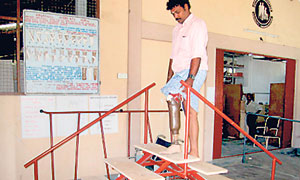The Jaffna Jaipur Centre for Disability Rehabilitation, established in 1987 by the Friend in Need Society in cooperation with the Mothers’ Front, helps conflict victims and people with physical disabilities return to a normal life by providing them with orthopaedic devices.
Among its beneficiaries are people who had lost limbs in accidents and those who suffered from congenital or acquired disabilities, including polio and club foot. The centre also caters to the needs of people who lose their limbs in landmine blasts. The estimated number of mines in Sri Lanka is 600,000 to two million, a large proportion of them in the Jaffna peninsula. Of more than 1,750 patients registered at the centre, about 1,000 are war wounded while some 650 are landmine victims. Between 1987 and 2006, the centre supplied some 4,000 prostheses, with some 2, 000 of them being landmines victims.
Before the centre was established, patients had to go all the way to Colombo, making treatment inaccessible and costly. The Jaffna centre is the only facility providing prosthetic and orthotic devices and orthopaedic services in the northern peninsula.
K. Uthayarani, a 30-year-old polio victim had little mobility in either leg. But she did not allow this to stop her from working as a seamstress.
The visit to the centre came as a turning point in Uthayarani’s life. "I needed help even for basic personal care, but now I will be able to do it all by myself,” she said beaming as she gingerly took her first steps with the new orthotic device.
The ICRC began assisting the centre in 1994. Following a break, from 2003 to 2007, it resumed its assistance to the centre. It provides financial, logistical and material support and equipment for the production of orthopaedic appliances. It also offers technical expertise in physiotherapy and orthoprosthetics, management support and staff training.
Initially, technology developed in the state of Jaipur in India was used at the centre to produce orthopaedic devices. Using local raw material, the Jaipur technology provided a quick and cost-effective way of making artificial limbs to suit individual needs.
In 1999, with ICRC funding, the centre began using the polypropylene technology, making it possible to produce prostheses out of plastic sheets instead of aluminum. The advantage of this is that it prevents skin damage and allows for a snug fit because of better alignment with the natural limb.
The centre holds a free monthly clinic where the Jaffna Hospital’s consultant orthopaedic surgeon sees special cases. |

